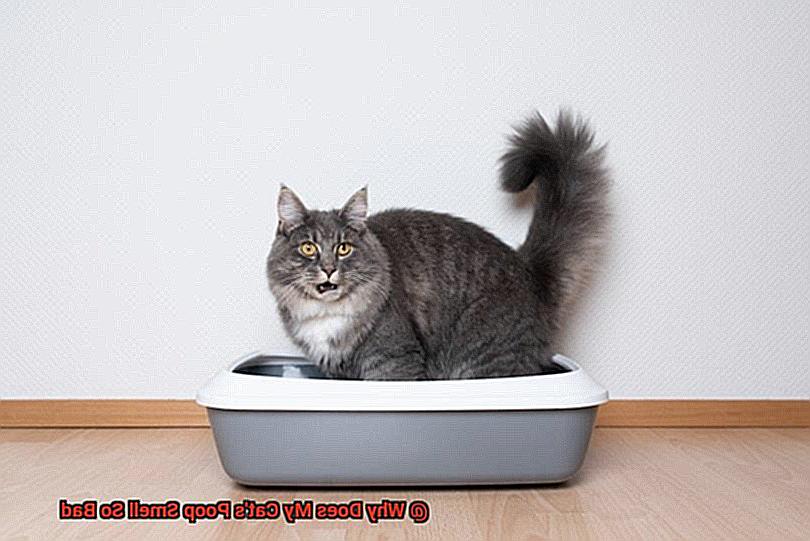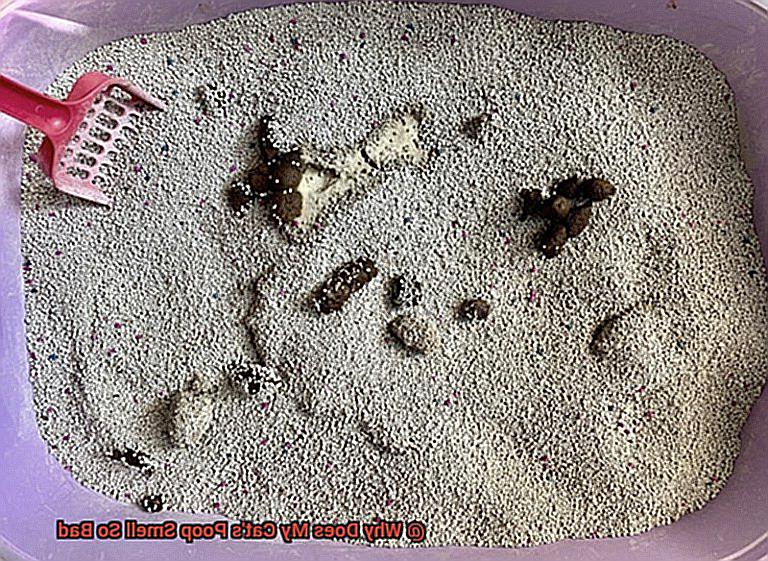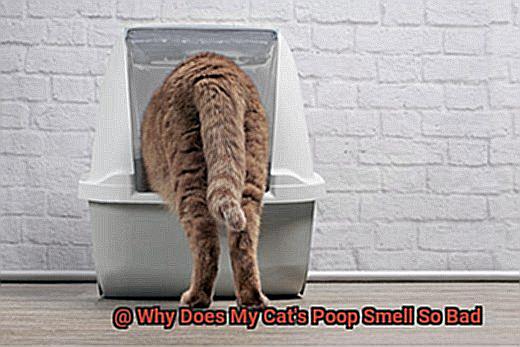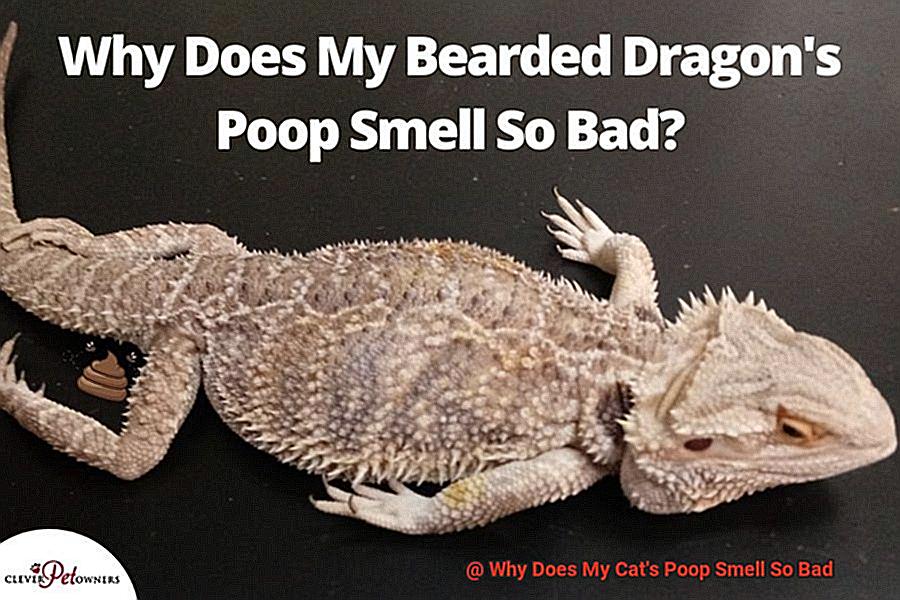Cats are undoubtedly adorable creatures, but let’s be honest; their poop can be downright unpleasant. As pet owners, it’s essential to understand why our furry friends’ feces smell so bad. After all, we don’t want our homes to reek of cat poop.
Perhaps you’ve tried to ignore the odor or cover it up with air fresheners, but that’s not a long-term solution. It’s time to face the issue head-on and find out what causes the stench.
Your cat’s diet is one of the most significant factors that contribute to the smell of its poop. If your feline friend eats low-quality food, it will produce more waste with a stronger odor. Additionally, if your cat has any health issues like gastrointestinal problems or parasites, it can affect their bowel movements and result in foul-smelling feces.
But wait, there’s more. The type of litter you use can also play a role in the malodor emanating from your cat’s litterbox. Some litters trap odors better than others, and some have added fragrances that mask smells but may cause respiratory problems for your cat.
In this blog post, we’ll delve into these reasons and more about why your cat’s poop smells so bad. We’ll also offer practical solutions on how you can alleviate the stench and maintain good hygiene for your furry friend. So buckle up and let’s get started on this pungent journey together.
What Causes Cat Feces to Smell Bad?
Let’s dive into the various factors that contribute to this malodorous issue.
Firstly, your cat’s diet plays a significant role in how bad their feces smells. Cats are obligate carnivores and require a protein-rich diet. However, when they digest protein, it produces ammonia, which is a leading cause of the bad smell. So, the more meat your furry friend eats, the stronger the odor will be.
Secondly, bacteria in your cat’s digestive system can also contribute to the odor. These bacteria help break down food, but they also produce gas and other byproducts that add to the unpleasant smell. So, while these bacteria are essential for your cat’s digestion, they also play a role in creating an olfactory nightmare.
Thirdly, hydration levels play an important role in the smell of your cat’s feces. If your cat is dehydrated, their feces will be dry and hard, leading to constipation and an unpleasant odor. On the other hand, if they are well-hydrated, their feces will be soft and less odorous. So, always make sure your kitty has access to plenty of fresh water.
Moreover, certain health issues such as infections or inflammation in the digestive system can cause diarrhea or loose stools with a strong odor. Diseases such as kidney failure can also cause toxins to build up in the body resulting in foul-smelling feces. So, any sudden changes in your cat’s fecal odor should be checked by a veterinarian.
Lastly, the type of litter you use can affect how bad your cat’s feces smells. Using a litter that doesn’t absorb moisture well or contains strong fragrances can make the odor worse. Similarly, not cleaning the litter box regularly can make the smell more pronounced over time. So, choose a litter that effectively absorbs moisture and has minimal fragrance and clean the litter box daily.
So, several factors contribute to why cat feces smell so bad. As a responsible pet owner, it’s important to provide your cat with a balanced diet, adequate hydration levels, and regular veterinary check-ups.
Additionally, using an appropriate litter and cleaning the litter box regularly can help minimize the odor for both you and your feline companion’s comfort.
Diet and Its Effect on the Odor of Cat Poop
There are steps you can take to reduce the smell and promote healthy bowel movements for your feline friend.
Cats are obligate carnivores, which means they require a high protein diet to thrive. The quality of protein in their diet affects the odor of their poop. If you notice that your cat’s poop smells off-putting, it could be due to low-quality protein or fillers such as corn or wheat. These ingredients are harder for your cat’s digestive system to break down, resulting in more waste material produced, frequent bowel movements, and smellier poop.
Moreover, insufficient fiber or moisture in your cat’s diet can cause constipation or dry, hard stools that are difficult to pass and have a stronger odor.
Feeding your cat a high-quality diet that is rich in animal protein and moisture can help regulate their digestive system and reduce the odor of their poop.

Wet food is particularly beneficial since it provides additional hydration that helps prevent constipation and promote healthy bowel movements.
In addition to choosing a high-quality food, adding probiotics or digestive enzymes can aid in digestion and reduce the smell of your cat’s poop. Therefore, if you’re concerned about the odor of your cat’s feces or any digestive issues, speak with your veterinarian about the best diet for your cat’s individual needs.
Hydration and Its Impact on the Smell of Cat Poop
Well, hydration might just be the answer to your smelly dilemma. As an expert in this field, I can tell you that hydration plays a vital role in the smell and texture of cat poop.
When a cat is dehydrated, their feces become hard and dry, making it difficult for them to pass stool. This can lead to constipation and an increase in the smell of their poop. Conversely, when a cat is hydrated, their feces are softer, making it easier for them to pass stool and reducing the strong odor.
Each cat has different hydration requirements based on factors such as age, weight, diet, and activity level. In general, cats should consume around 3.5-4.5 ounces of water per 5 pounds of body weight each day. However, this can vary based on your cat’s individual needs.
You can ensure that your cat stays hydrated by providing them with fresh water at all times. It is essential to regularly clean your cat’s water bowl to prevent the growth of harmful bacteria and other organisms that could cause infections.
Another effective way to keep your kitty hydrated is by feeding them wet food instead of dry food. Wet food contains more moisture than dry food, which can help keep your cat hydrated and improve the smell of their poop.
Health Issues That Could Lead to a Change in Smell of Cat Poop
While the smell of cat poop is never a delightful experience, a sudden change in odor could be a red flag for an underlying health issue. As an expert on this matter, I can attest that there are several health problems that can lead to changes in the scent of your cat’s poop.
Gastrointestinal issues are one of the most common culprits behind changes in poop odor. If your cat has inflammatory bowel disease or parasites, they may experience diarrhea, constipation, and other digestive problems that can affect the smell of their poop. If you notice any sudden changes accompanied by these symptoms, don’t hesitate to take your feline friend to the vet right away.
Another health issue that can lead to changes in poop odor is kidney disease. When your cat’s kidneys aren’t functioning correctly, toxins build up in their body, resulting in a strong smell in both their urine and feces. This condition is especially prevalent in older cats, so it’s crucial to keep an eye out for any changes in your senior cat’s bathroom habits.
Diabetes is yet another health issue that can affect the aroma of your cat’s poop. If you detect a sweet or fruity smell in your cat’s poop, this could indicate high levels of glucose in their bloodstream due to diabetes. Other signs of diabetes include increased thirst and urination, weight loss, and lethargy.
Liver disease is another possible cause of changes in poop odor. When your cat has liver disease, toxins can accumulate in their body that can impact the scent of their poop. Other symptoms of liver disease include vomiting, jaundice, and weight loss.
If you notice any changes in your cat’s poop smell, don’t hesitate to consult with your veterinarian immediately. A change in odor could be an indicator of an underlying health problem that requires prompt medical attention.
How to Reduce Unpleasant Odors from Cat Poop
However, with a few simple steps, you can create a more pleasant living environment for both you and your furry friend. Here are five sub-sections on how to reduce unpleasant odors from cat poop:
Keep the Litter Box Clean
Cleaning the litter box regularly is crucial for reducing unpleasant odors. Cats are naturally clean animals and prefer a clean litter box. Scooping out the solids daily and changing the entire litter once a week will not only help reduce smells but also keep your cat healthy and happy. A dirty litter box can lead to health problems, including urinary tract infections or constipation.
Choose High-Quality Litter
Not all cat litters are created equal, and choosing the right one can make a big difference in reducing unpleasant odors. Consider using high-quality litter that is specifically designed to control odors. Some litters contain activated charcoal or baking soda that can absorb smells effectively. Additionally, clumping litters can make scooping easier and more efficient.

Use Odor Control Products
Adding odor control products to the litter box can provide an extra layer of protection against unpleasant smells. Deodorizers and sprays are available in the market, which can help neutralize smells. However, it’s essential to use these products sparingly and according to instructions to avoid irritating your cat’s respiratory system.
Feed Your Cat a Healthy Diet

A balanced diet with high-quality proteins and fiber can promote healthy digestion and reduce odor. Make sure your cat has access to fresh water at all times, and encourage them to stay hydrated by providing a drinking fountain or adding wet food to their diet. A healthy diet can help prevent constipation, which can lead to more severe odor problems.
Talk to Your Veterinarian
If you’re still struggling with unpleasant odors despite taking these steps, it’s worth talking to your veterinarian. Excessive odor can sometimes be a sign of an underlying health problem that needs to be addressed. Your vet may recommend dietary changes or other interventions that can help reduce odor and improve your cat’s overall health.
In conclusion, reducing unpleasant odors from cat poop requires regular cleaning, high-quality litter, odor control products, a healthy diet, and possibly veterinary attention. By following these tips, you can create a more pleasant living environment for both you and your feline friend.
Tips for Maintaining a Healthy Diet for Your Cat
Not only does it prevent health issues, but it can also reduce the odor of their poop. With these seven tips, you can ensure your cat is getting the proper nutrition they need.
Choose high-quality cat food
Your cat’s food should have high-quality protein as its first ingredient, such as chicken or fish. Avoid fillers like corn and soy, which can cause digestive issues and smelly poop.

Avoid overfeeding
Overfeeding can lead to obesity and other health issues, including digestive problems that can cause bad smelling poop. Follow the feeding guidelines on the cat food label and adjust according to your cat’s activity level.
Provide fresh water
Always make sure your cat has access to fresh water. Dehydration can cause constipation and smelly poop.
Consider wet food
Wet food can help increase your cat’s water intake and aid in digestion, leading to less smelly poop. It can also help prevent urinary tract infections.
Introduce fiber into their diet
Fiber can help regulate digestion and prevent constipation. Canned pumpkin or psyllium husk are great options to add to their food.
Avoid human food
Your cat has specific nutritional needs, so stick to cat-specific food. Human food can upset their stomach and lead to smelly poop.
Consult with a veterinarian
If you’re unsure about what to feed your cat or they have persistent digestive issues, consult with a veterinarian for advice on a proper diet and any necessary supplements.
By following these tips, you’re providing your cat with a healthy and balanced diet that will lead to better overall health and less smelly poop.
Proper Hydration Practices for Your Cat
And one of the most crucial ways to do so is by ensuring that they stay properly hydrated. Dehydration can lead to a wide range of health problems, from kidney issues to urinary tract infections. So, let’s dive into some helpful tips and tricks for maintaining proper hydration practices for your furry companion.
First things first, always make sure your cat has access to fresh, clean water at all times. It’s essential to change their water bowl daily and ensure it remains filled throughout the day. Keep in mind that some cats are quite picky about their water temperature, so try experimenting with different temperatures to see what your kitty prefers.
If you’ve noticed that your cat isn’t drinking enough water, consider investing in a drinking fountain. Cats are naturally drawn to moving water, so a fountain can pique their interest and encourage them to drink more. You can also add some flavor to their water by adding a small amount of tuna juice or broth.

Another fantastic way to keep your cat hydrated is by feeding them wet food. Wet food has a higher moisture content than dry kibble, which can help keep your cat’s hydration levels in check. But if you prefer to feed your cat dry kibble, you can always add some water or chicken broth to their food to increase their fluid intake.
It’s critical to keep an eye on your cat’s hydration levels and make adjustments as necessary. Signs of dehydration in cats include dry gums, sunken eyes, lethargy, and loss of appetite. If you suspect that your cat may be dehydrated, it’s crucial to seek veterinary care immediately.
In conclusion, proper hydration practices are vital for your cat’s overall health and well-being. Motivate your cat to drink more water by providing them with a drinking fountain or adding some flavor to their water. Consider feeding them wet food or adding water or broth to their dry food. And always monitor your cat’s hydration levels and seek veterinary care if needed.
Signs of Health Issues in Cats That Could Lead to a Change in the Smell of Their Feces

Read on to discover the signs of health problems in cats that could lead to a change in the smell of their feces.
Firstly, digestive issues such as diarrhea or constipation can affect the smell of your cat’s poop. These issues may be a sign of food intolerance, allergies, or infections. If you notice any changes in your cat’s bowel movements or smell, seek veterinary attention immediately.
Secondly, dehydration can cause feces to have an unpleasant odor. If your cat isn’t drinking enough water, it can be a sign of kidney disease or other health problems. Entice your cat to drink more by investing in a drinking fountain or adding flavor to their water.
Thirdly, intestinal parasites such as worms or giardia can alter the smell of your cat’s feces. These parasites can also cause vomiting, weight loss, and lethargy and require veterinary treatment.
Fourthly, cats with diabetes may have sweet-smelling feces due to the presence of glucose in their urine. Diabetes can also cause increased thirst and urination, weight loss, and lethargy.
Lastly, liver disease can affect the smell of your cat’s feces due to the buildup of toxins in their body. Other symptoms of liver disease include yellowing of the skin and eyes, vomiting, and loss of appetite.
It’s vital to monitor any changes in the smell of your cat’s feces and seek veterinary attention if you notice concerning symptoms. Regular check-ups and preventative care can help identify and address potential health issues before they become severe.
IS-2WN07iVQ” >
Conclusion
In conclusion, the stench of your cat’s poop can be overwhelming, but don’t let that discourage you from taking action. There are several underlying reasons behind the odor, including diet, hydration levels, and health issues. As a responsible pet owner, it’s crucial to provide your cat with a balanced diet that includes animal protein as its first ingredient and fresh water at all times.
To keep unpleasant smells at bay, regularly cleaning the litter box with high-quality litter that controls odors is essential. You can also add odor control products sparingly or invest in a drinking fountain to ensure your cat stays hydrated. However, if you notice any changes in your cat’s poop smell, it’s vital to consult with a veterinarian promptly.
By following these tips and maintaining good hygiene practices for your furry friend, you can create a more pleasant living environment for both you and your beloved feline companion.
Remember that caring for your cat’s health is not just about keeping their coat shiny or their purr loud; it also involves ensuring they have healthy digestion and regular veterinary check-ups.







